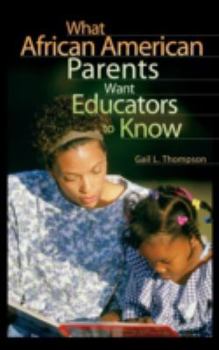What African American Parents Want Educators to Know
Select Format
Select Condition 
Book Overview
Thompson designed an empirical study to gather feedback from African-American parents on numerous issues pertaining to their children's schooling experiences. The results, discussed in this book, can be utilized to improve the schooling experiences of African-American children nationwide.
The African-American parents/guardians who participated in this study were biological parents in two-parent homes, single parents, grandparents, foster parents, and stepparents who were rearing school-age children. Some had been deterred from completing their own formal education as a result of peer pressure, temptation outside of school, or stressful circumstances. Others had positive schooling experiences and stable childhoods. Regardless of the differences in their background experiences, the majority of these parents or guardians were single-minded about wanting a better life for their children, believing that a good K-12 education and college education were crucial to their children's advancement. And while most believed resolutely in the hope offered by the public school system, they recognized that schools couldn't do it all. African-American parents and guardians are willing to work with teachers and administrators to ensure that their children receive a quality education. Yet if the historic achievement gap is ever to be eradicated, teachers, administrators, researchers, and policymakers must be more willing to view African-American parents/guardians as assets. African-American parents/guardians must be invited to verbalize their concerns, and those concerns must be taken seriously to effect meaningful and lasting change in the public school system.Format:Hardcover
Language:English
ISBN:0897898931
ISBN13:9780897898935
Release Date:May 2003
Publisher:Praeger
Length:232 Pages
Weight:1.10 lbs.
Dimensions:0.9" x 6.5" x 9.5"
Customer Reviews
0 rating





